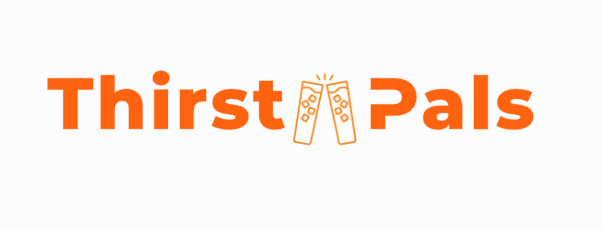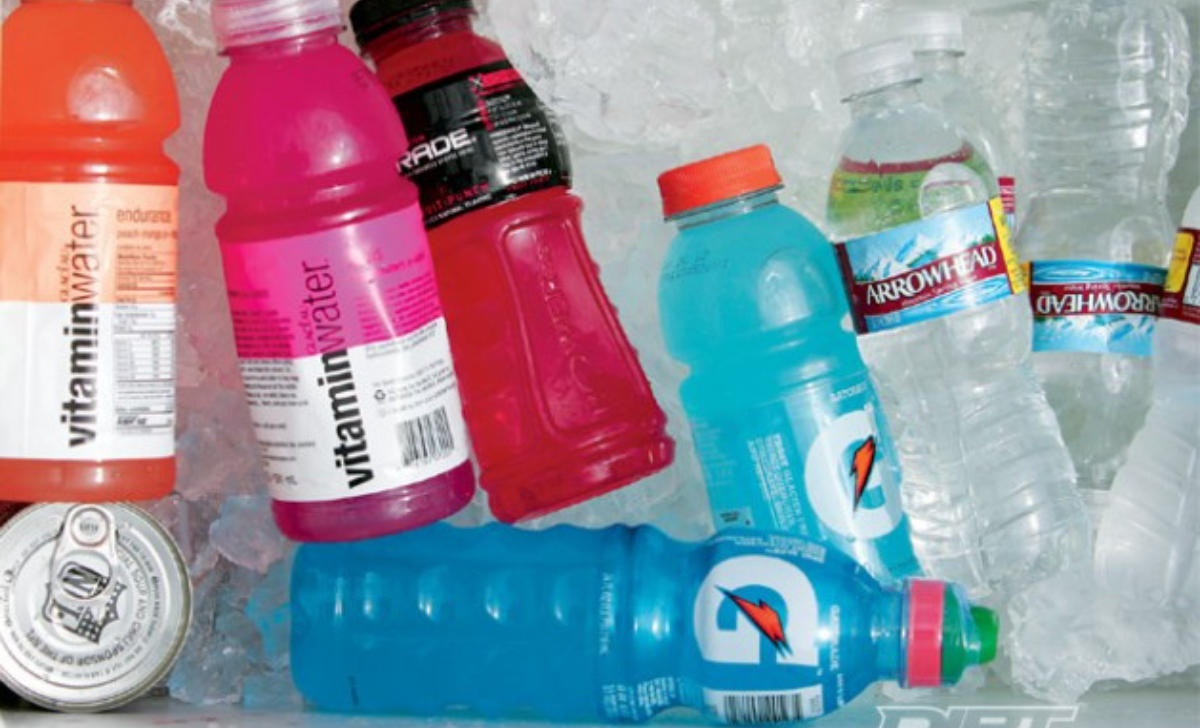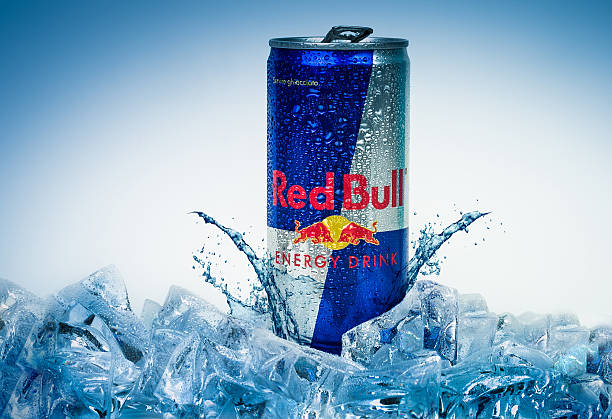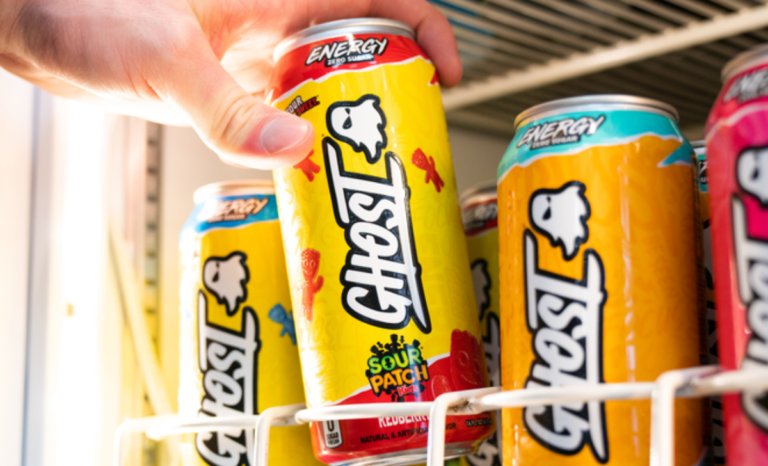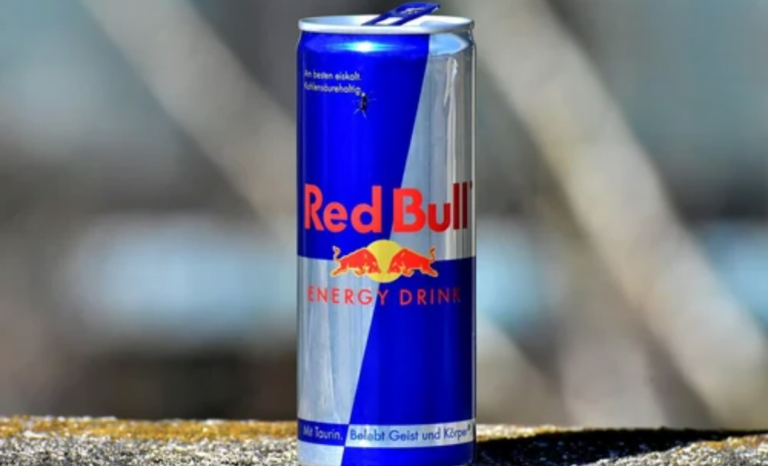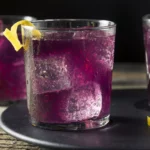Gatorade vs Vitamin Water – two popular choices in the sea of hydration options. When it comes to replenishing fluids after a workout or just staying refreshed, these beverages stand out. Let’s dive into the differences and similarities to help you choose your ideal thirst quencher.
Gatorade, the OG of sports drinks, has been fueling athletes since the ’60s. Packed with electrolytes like sodium and potassium, it aims to replace what you lose through sweat during intense physical activity. Known for its vibrant colors and diverse flavors, Gatorade isn’t just a drink; it’s a hydration experience.
On the other side of the ring, we have Vitamin Water, a relative newcomer with a focus on, you guessed it, vitamins.
It’s like your daily supplement in liquid form, offering a boost of vitamins and minerals along with hydration. With flavors ranging from tropical to berry, it’s the trendy choice for those seeking a nutrient-infused sip.
Gatorade vs Vitamin Water: A Detailed Comparison
In the realm of beverages, two titans clash for supremacy: Gatorade, the king of sports drinks, and Vitamin Water, the champion of flavored hydration.
But when it comes to quenching your thirst and nourishing your body, which one reigns supreme? Let’s delve into the depths of their ingredients, benefits, and drawbacks to determine the victor in this epic battle of the bottles.
Gatorade vs Vitamin Water Ingredients
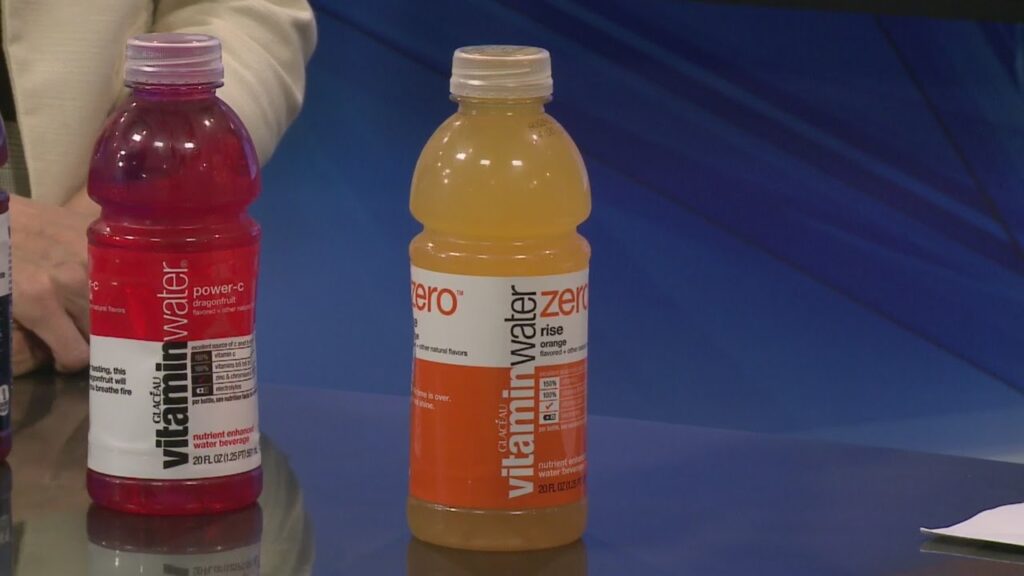
When it comes to ingredients, Gatorade and Vitamin Water bring their unique blends to the hydration game.
Gatorade boasts electrolytes like sodium and potassium, aiding in quick replenishment during intense physical activity.
On the flip side, Vitamin Water takes a vitamin-centric approach, infusing its drinks with nutrients like vitamin C and B vitamins.
Gatorade Ingredients
Electrolytes: The star of the show! Gatorade contains key electrolytes like sodium, potassium, magnesium, and chloride, which help replenish what you lose through sweat during exercise. These minerals are crucial for muscle function, hydration, and overall performance.
Carbohydrates: Primarily in the form of sugars like sucrose and dextrose, these provide quick energy, especially during intense workouts. However, be mindful of the sugar content, as a 20-ounce bottle can pack up to 36 grams which is equal to 140 calories.
Citric Acid: Adds a tangy flavor and helps preserve the drink.
Artificial Flavors and Colors: Some Gatorade flavors use artificial ingredients to achieve specific tastes and visual appeal.
Water: The base of the beverage, responsible for keeping you hydrated.
Vitamin Water ingredients
Vitamins and Minerals: A blend of vitamins like C, B6, B12, and E, along with minerals like magnesium and manganese, aims to provide a general health boost. However, the amounts are often small compared to what you could get from a balanced diet.
Sweeteners: Typically a combination of cane sugar and crystalline fructose, contributing to the drink’s sweetness. Again, the sugar content deserves attention, with around 26-27 grams per 20-ounce bottle.
Natural Flavors: Vitamin Water emphasizes using natural flavorings, although some varieties might still contain artificial ingredients.
Stevia Leaf Extract: Some flavors use stevia as a natural sweetener, offering a calorie-free alternative.
Water: Just like Gatorade, water forms the foundation of the beverage.
Comparing the Formulas: Gatorade vs vitamin water
Lets compare Gatorade vs vitamin water vs Gatorade zero ingredients.
Electrolytes
Both Gatorade and Vitamin Water contain electrolytes, with Gatorade often being associated with higher quantities due to its focus on replenishing those lost during intense physical activity.
Sodium and potassium are key players in Gatorade, aiding in muscle function and hydration.
Vitamin Water, while also offering electrolytes, tends to have a lighter concentration, making it suitable for daily hydration.
It’s worth noting Gatorade Zero, a variant with reduced calories, sugars, and electrolytes. Gatorade Zero provides a hydrating option for those looking to minimize calorie and sugar intake without sacrificing essential electrolytes during workouts.
For electrolyte replenishment, especially after exercise, Gatorade is the clear winner. Vitamin Water, however, provides minimal electrolytes and is better suited for general hydration with added vitamins and minerals.
This data is Data based on nutritional labels of respective beverages. Gatorade Thirst Quencher provides significantly more sodium and potassium than Vitamin Water. Gatorade Zero provides same amount of electrolytes with less calories.
| Electrolyte | Gatorade Thirst Quencher (20 oz) | Gatorade Zero (20 oz) | Vitamin Water (20 oz) | Vitamin Water Zero (20 oz) |
|---|---|---|---|---|
| Sodium | 270 mg | 160 mg | 0 mg | 0 mg |
| Potassium | 80 mg | 75 mg | 0 mg | 0 mg |
| Magnesium | 15 mg | 20 mg | 10 mg | 10 mg |
As you can see, Vitamin Water Zero aligns with the original Vitamin Water in terms of electrolyte content, offering moderate levels of potassium and magnesium compared to the higher levels in Gatorade. Both Gatorade options still provide significantly more sodium than the Vitamin Water versions.
Sugar Content
Sugar content is a significant factor, especially in the era of heightened health consciousness. Gatorade traditionally contains sugar as a quick energy source during physical activities.
So, Gatorade Thirst Quencher has the highest sugar content of 36 g per 20 oz serving, offering significant electrolytes but also exceeding recommended daily intake.
It is best for athletes and runners, because studies have shown that ingesting carbohydrates when doing high intensity exercise actually increases performance and reduces fatigue.
In contrast, Vitamin Water opts for a combination of crystalline fructose and cane sugar, aiming for a balanced sweetness. Gatorade Zero, a sugar-free variant, caters to those watching their sugar intake.
Comparatively, Gatorade Zero stands out with its minimal sugar content, making it a favorable choice for individuals striving to reduce their sugar consumption.
It’s essential to consider the recommended daily sugar intake, which is approximately 25 grams for women and 38 grams for men. Gatorade Zero aligns well with these guidelines.
| Beverage: | Sugar (grams) |
|---|---|
| Gatorade Thirst Quencher (20 oz) | 36 g |
| Gatorade Zero (20 oz) | 0 |
| Vitamin Water (20 oz) | 26-27 g |
| Vitamin Water Zero (20 oz) | 0 |
Vitamins and Minerals
Vitamins and minerals contribute to overall health, and both Gatorade and Vitamin Water incorporate these essential nutrients into their formulas.
Vitamin Water, as the name suggests, places a strong emphasis on vitamins, including Vitamin C and B vitamins, supporting the immune system and various bodily functions.
Gatorade, while not as vitamin-focused, includes electrolytes and minerals like potassium, addressing specific needs for active individuals.
The choice between the two depends on whether you prioritize a vitamin-rich hydration experience (Vitamin Water) or a more electrolyte-centric approach (Gatorade).
Sweeteners
Sweeteners determine the beverage’s taste and caloric content. Gatorade typically relies on sugars for sweetness, providing a quick energy boost during physical exertion.
Vitamin Water opts for a combination of natural sweeteners like crystalline fructose and cane sugar, aiming for a balance between sweetness and nutritional value.
Gatorade Zero, a sugar-free alternative, uses artificial sweeteners such as sucralose and acesulfame potassium to maintain sweetness without added sugars. This makes Gatorade Zero a suitable choice for those seeking reduced calorie and sugar options without compromising flavor.
Coloring
Coloring adds visual appeal to these beverages. Gatorade often employs artificial coloring, like Yellow 6, to achieve its vibrant hues.
In contrast, Vitamin Water leans towards natural coloring, utilizing berry and fruit juice for a visually appealing and natural look.
In the Gatorade vs Vitamin Water formula face-off, the winner depends on your hydration needs.
- Gatorade suits intense workouts, providing quick energy and electrolyte replenishment.
- Vitamin Water, with its vitamin-rich formula, is tailored for everyday hydration with a nutrient boost.
Gatorade vs Vitamin water Nutritional Facts
Gatorade Thirst Quencher delivers the highest calorie and sugar content. Both Gatorade Zero and Vitamin Water Zero offer sugar-free alternatives. Vitamin Water boasts added vitamins and minerals, although the specifics vary.
Here’s a comprehensive comparison of the nutritional values for Gatorade Thirst Quencher (20 oz), Gatorade Zero (20 oz), Vitamin Water (20 oz), and Vitamin Water Zero (20 oz):
| Nutrient | Gatorade Thirst Quencher | Gatorade Zero | Vitamin Water | Vitamin Water Zero |
|---|---|---|---|---|
| Calories | 140 | 10 | 90-100 | 5 |
| Fat | 0 g | 0 g | 0 g | 0 g |
| Carbohydrates | 36 g | 1 g | 26-27 g | 0 g |
| Sugars | 36 g | 0 g | 26-27 g | 0 g |
| Protein | 0 g | 0 g | 0 g | 0 g |
| Vitamins | Minimal (citric acid) | Minimal (citric acid) | Added (varies by flavor) | Added (varies by flavor) |
| Minerals | Minimal (citric acid) | Minimal (citric acid) | Added (varies by flavor) | Added (varies by flavor) |
Vitamin Water vs Gatorade Benefits
In the realm of hydration, Gatorade and Vitamin Water emerge as popular choices, each presenting distinct benefits to suit various preferences and needs.
Gatorade Benefits
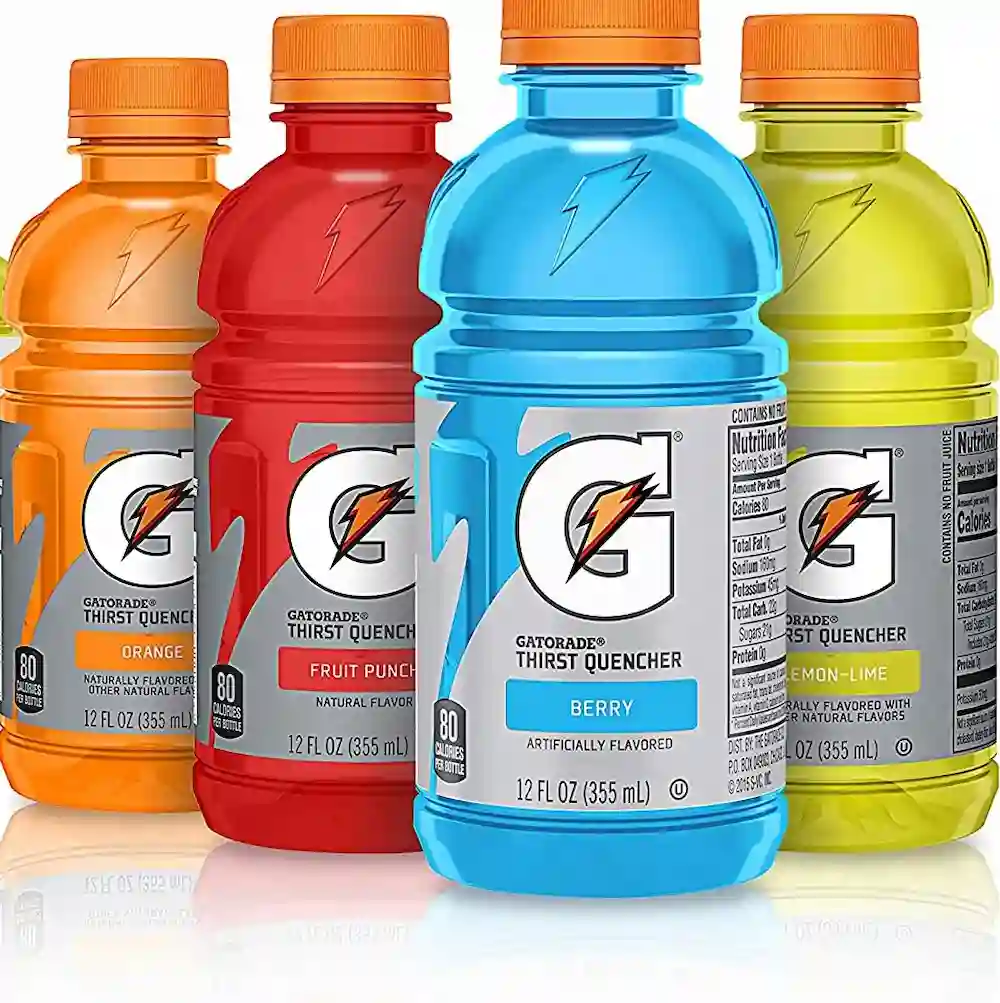
Gatorade, renowned for its prowess in electrolyte replenishment and rapid hydration, caters primarily to athletes and fitness enthusiasts.
1. Electrolyte Replenishment
Gatorade is renowned for its effectiveness in replenishing electrolytes, such as sodium and potassium, lost during intense physical activity. This makes it an ideal choice for athletes and individuals engaged in prolonged workouts.
2. Rapid Hydration
Gatorade’s formula is specifically designed to provide quick hydration, making it valuable for preventing dehydration during high-intensity exercises. The combination of water, sugars, and electrolytes helps maintain fluid balance in the body.
3. Energy Boost
The presence of sugars in Gatorade provides a rapid source of energy, making it beneficial for those needing an immediate energy boost during physical exertion.
4. Tailored for Athletes
Gatorade’s benefits are particularly tailored to meet the hydration and energy needs of athletes and those involved in strenuous workouts. Its formulation addresses the specific requirements of individuals pushing their physical limits.
Vitamin Water Benefits
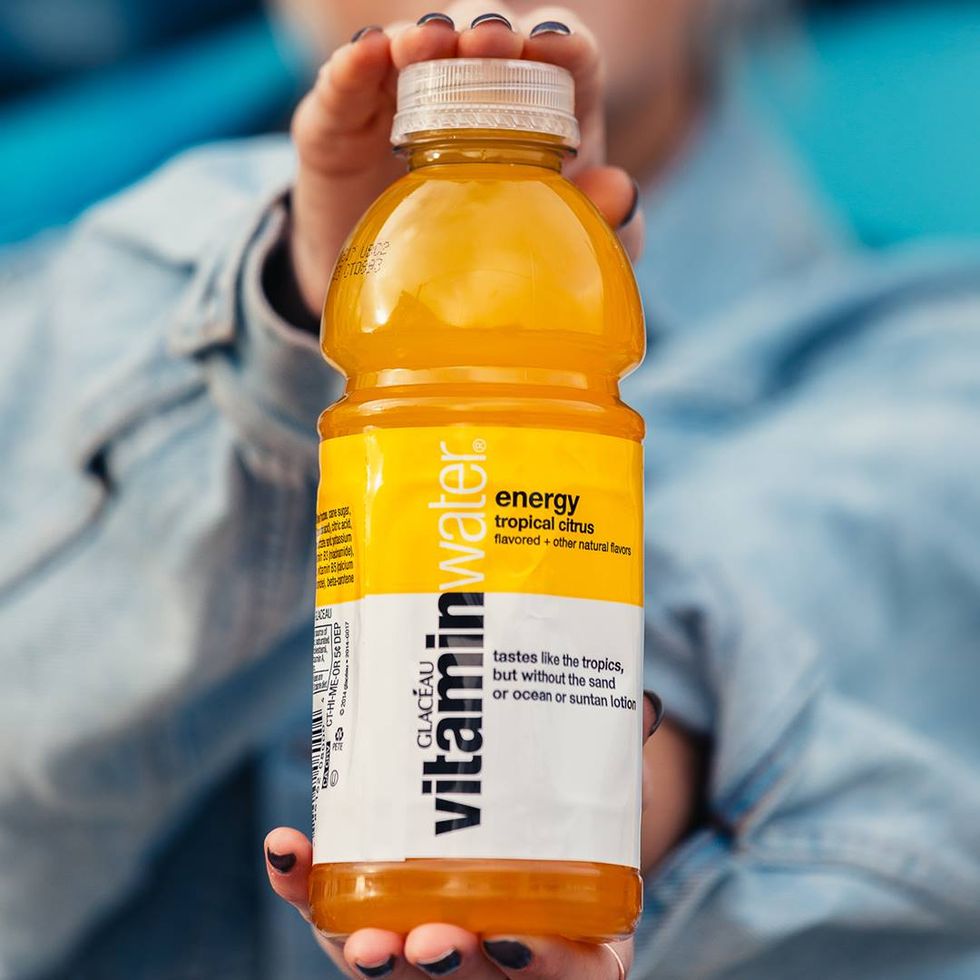
Vitamin Water brings a daily nutrient boost to routine hydration. Here are specific benefits of Vitamin water.
1. Vitamin and Mineral Infusion
Vitamin Water goes beyond basic hydration by infusing essential nutrients, including Vitamin C and B vitamins, contributing to immune support and various bodily functions.
2. Daily Hydration
Formulated for everyday use, Vitamin Water serves as a refreshing beverage that not only quenches thirst but also provides added nutritional benefits, making it a suitable option for routine hydration.
3. Variety of Flavors
With a diverse range of flavors, Vitamin Water offers a pleasant and varied drinking experience, catering to those who enjoy a more subtle taste along with their hydration.
Gatorade vs Vitamin water possible side Effects
While Gatorade and Vitamin Water are popular beverages known for their hydration benefits, it’s essential to be aware of potential side effects associated with their consumption. Both drinks, despite their positive attributes, may have certain considerations to keep in mind.
Gatorade Possible Side Effects
1. Sugar Content:
While the sugar in Gatorade provides a quick energy boost, excessive consumption may contribute to increased calorie intake and potential weight gain.
Additionally, high sugar intake is associated with various health concerns, including tooth decay and an increased risk of chronic conditions like obesity and type 2 diabetes.
2. Artificial Additives:
Certain Gatorade formulations may contain artificial additives, such as colorings and flavorings. While considered safe for most people, some individuals may be sensitive to these additives, experiencing allergic reactions or digestive discomfort.
It is important to check expiry date before using Gatorade as there have been reports of Moldy Gatorade by customers which can cause serious health problems.
3. Electrolyte Imbalance:
In rare cases, excessive consumption of Gatorade without sufficient water intake may lead to electrolyte imbalance. This is more common in scenarios where large quantities are consumed without a corresponding need for electrolyte replenishment.
Vitamin Water Possible Side Effects
1. Sugar Content:
Similar to Gatorade, Vitamin Water contains sugars that contribute to its taste. Excessive consumption can lead to the same potential side effects associated with high sugar intake, including weight gain and increased risk of metabolic issues.
2. Artificial Additives:
Certain flavors of Vitamin Water may contain artificial additives for color and flavor. While generally recognized as safe, individuals with sensitivities or allergies to artificial ingredients should exercise caution.
3. Fortified Vitamin Concerns:
While the added vitamins and minerals in Vitamin Water can be beneficial, excessive intake of certain vitamins, particularly fat-soluble ones like vitamin A and vitamin D, may lead to toxicity. It’s important to be mindful of overall nutrient intake from various sources.
Gatorade vs Vitamin Water taste and Flavors
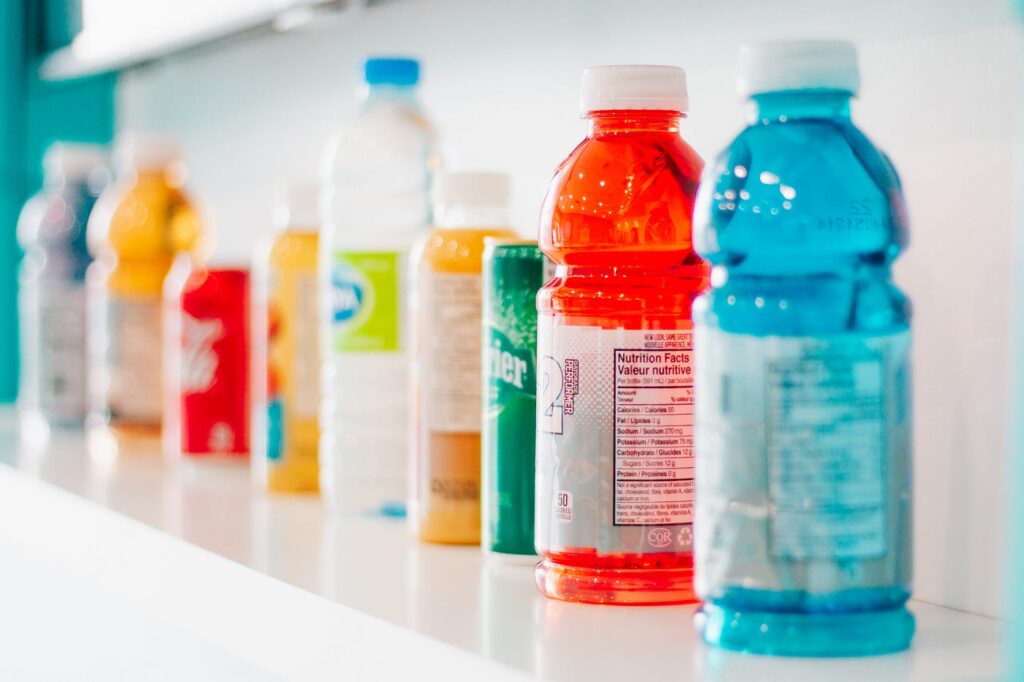
The taste and variety of flavors play a significant role in the appeal of beverages like Gatorade and Vitamin Water. Let’s explore the Gatorade and Vitamin water distinct taste profiles and the array of flavors offered by these hydration options.
Gatorade: Bold and intense Flavors
Gatorade is renowned for its bold and intense flavors, catering to those who seek a burst of taste during hydration.
The classic Gatorade lineup features flavors like Lemon-Lime, Orange, Fruit Punch, and Glacier Freeze. These options are designed to be vibrant and energizing, enhancing the overall drinking experience.
Gatorade also frequently introduces limited-edition and specialty flavors to keep its offerings diverse and appealing.
Variety: Offers a good range of fruit-based flavors, with some venturing into bolder territories like Fierce Strawberry and Cool Blue. Limited sugar-free options available.
Sweetness: Generally sweet due to high sugar content, though sweetness levels can vary by flavor.
Artificial Ingredients: Some flavors use artificial flavors and colors, impacting the taste profile.
Vitamin Water: Subtle and Mild Flavors
In contrast, Vitamin Water offers a milder and more subtle taste, making it a preferred choice for those who enjoy a lighter drinking experience.
The flavor range of Vitamin Water includes options like Dragonfruit, Kiwi-Strawberry, and Acai-Blueberry-Pomegranate.
The emphasis here is on providing a refreshing and nuanced taste, with a focus on natural flavors. Vitamin Water’s flavor palette is often crafted to be versatile and appealing to a broader audience.
Variety: Explores exotic fruit blends, tropical flavors, and even “functional” options like Immune Power Tropical Orange and Mind Focus Mango Medley. More extensive sugar-free selection.
Sweetness: Varies depending on flavor, with some being quite sweet and others more mellow. Often uses a blend of natural and artificial sweeteners.
Natural Ingredients: Some flavors boast natural flavors and stevia as a sweetener, impacting the taste and health profile.
Overall:
- Gatorade: Ideal for those who prefer classic, sporty flavors and don’t mind the strong sweetness. Limited for those seeking adventurous taste buds or sugar-free options.
- Vitamin Water: A playground for adventurous palates, offering complex flavor combinations and diverse sweetness levels. More choices for sugar-conscious consumers.
Gatorade Vs Vitamin Water Price and Availability
Let’s tackle the battle of budgets and convenience for these two popular beverage brands:
Price
Gatorade: Typically ranges from $1.50 to $2.50 per 20oz bottle or single-serve packet. Variations can occur based on flavor, store, and quantity.
Vitamin Water: Often slightly pricier than Gatorade, around $1.75 to $3.00 per 20oz bottle or single-serve packet. Again, factors like flavor, store, and quantity can influence the price.
Availability
Gatorade: Widespread king, readily available in nearly all major supermarkets, convenience stores, and gas stations. You can find it online through a plethora of retailers.
Vitamin Water: More selective contender, primarily found in larger grocery stores, natural food stores, and online retailers. Less likely to be stocked in convenience stores or gas stations.
Also read our detailed comparison of Gatorlyte Vs Gatorade
Difference between Vitamin Water Zero and Gatorade Zero
Both Vitamin Water Zero and Gatorade Zero offer zero-calorie options, the choice depends on individual preferences, taste profiles, and specific hydration needs.
Vitamin Water Zero leans towards daily hydration with added nutrients, while Gatorade Zero caters to those requiring rapid electrolyte replenishment during intense physical activities.
| Aspect | Vitamin Water Zero | Gatorade Zero |
|---|---|---|
| Flavor Profile | Subtle, lighter taste | Bold, intense flavors |
| Nutritional Focus | Added vitamins and minerals | Rapid electrolyte replenishment |
| Electrolytes | Fewer electrolytes | More significant for sports |
| Sugar Content | Generally lower | Formulated without added sugars |
| Target Audience | Daily hydration seekers | Intense physical activity enthusiasts |
| Overall Purpose | Lighter daily use | Rapid hydration for sports |
Vitamin water Vs Gatorade: When to choose which drink
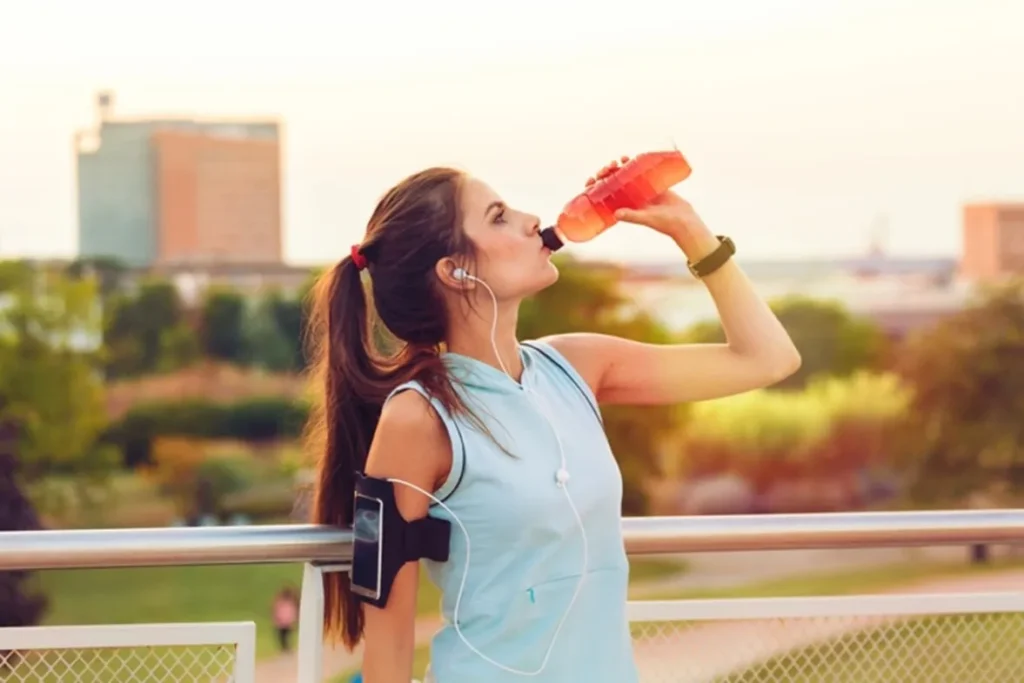
Choosing between Vitamin Water and Gatorade depends on various factors, including individual preferences, hydration needs, and lifestyle. Let’s explore when it might be the right time to opt for each beverage.
Choose Gatorade When
Intense Physical Activity: Gatorade is the go-to choice when engaging in high-intensity workouts, endurance exercises, or sports. Its formulation replenishes electrolytes lost during vigorous physical activities, ensuring quick hydration and providing an energy boost for sustained performance.
Electrolyte Replenishment: Opt for Gatorade after a sweaty workout or exposure to heat. The electrolyte content, including sodium and potassium, helps restore balance, preventing dehydration, and supporting muscle function.
Quick Energy Needs: Gatorade’s sugar content makes it suitable for those needing a rapid source of energy before or during physical exertion, making it ideal for immediate fuel during intense activities.
You can also mix Gatorade with other drinks. Check out Simple Non alcoholic Drinks to Make with Gatorade
Recovery from illness: Rehydrate and replenish electrolytes lost due to fever or diarrhea with Gatorade’s electrolyte content.
Extreme heat exposure: When working or playing outdoors in hot weather, Gatorade helps avoid dehydration and electrolyte imbalances.
Choose Vitamin Water When
Daily Hydration: For everyday hydration without intense physical activity, Vitamin Water’s lighter taste and added nutrients make it a favorable choice, offering a subtle alternative to traditional sports drinks.
Nutrient Boost: If you’re looking to supplement hydration with added vitamins and minerals, Vitamin Water’s infusion of essential nutrients, including vitamins C and B, makes it an appealing option for those seeking more than just hydration.
Hydration without the guilt: Opt for Vitamin Water Zero or other sugar-free versions to enjoy the flavor and added vitamins without the sugar spike.
Weight management: If you’re watching your sugar intake, sugar-free Vitamin Water can be a refreshing option while maintaining hydration.
Which One is Right for You Personally? Considerations
When navigating the world of Gatorade and Vitamin Water, your individual health conditions and sensitivities become crucial factors. Here’s a breakdown to help you make informed choices:
For those with:
High blood pressure: Choose Vitamin Water with caution. Check the sodium content in each flavor, as some can be high. Opt for lower-sodium options or stick to water for everyday hydration.
Diabetes: Choose Gatorade Zero or Vitamin Water Zero. These sugar-free options provide hydration without the blood sugar spike. Always monitor your blood sugar levels and consult your doctor before consuming any sugary beverages.
Kidney problems: Choose water. Both Gatorade and Vitamin Water can have high electrolyte and mineral content, which might not be suitable for those with kidney conditions. Consult your doctor for personalized recommendations.
Sensitivity to artificial sweeteners: Choose original Gatorade or natural-sweetener Vitamin Water. If you have concerns about artificial sweeteners, opt for versions with natural sugars or stick to plain water.
Digestive issues: Choose water or plain Gatorade. Some Vitamin Water flavors contain additional ingredients that might trigger digestive sensitivities. Consider plain Gatorade or water for milder options.
In summary,
- For active individuals needing post-workout hydration: Gatorade can be a good choice, but opt for sugar-free versions and prioritize water for everyday hydration.
- For general hydration and added vitamins: Choose Vitamin Water with caution, considering sugar content and potential interactions with medications. Water remains the healthiest choice for daily needs.
- For sugar-conscious individuals: Both brands offer sugar-free options, but water is always the healthiest low-calorie option.
Gatorade Vs Vitamin water: Which is healthier?
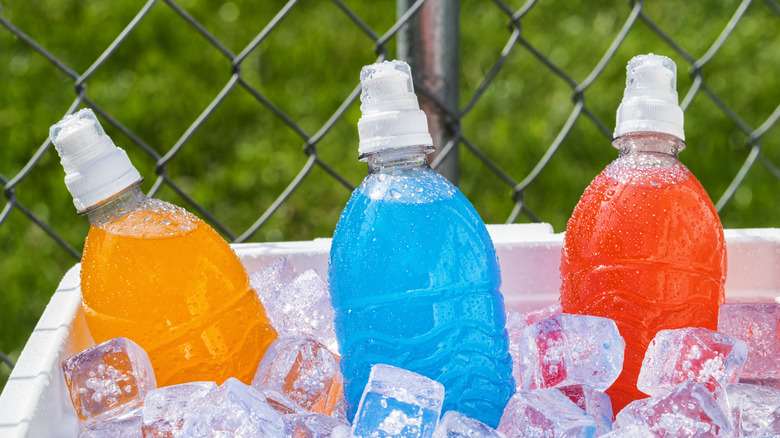
When it comes to crowning the healthier champion in the battle between Gatorade Vs Vitamin Water, the answer isn’t as simple as declaring a single winner. Both drinks offer advantages and disadvantages depending on your individual needs and health considerations. Let’s break it down:
Gatorade is designed for targeted hydration during intense physical activities, providing rapid electrolyte replenishment and a quick energy boost.
However, some Gatorade formulations may have higher sugar levels, which can be a concern for those monitoring their sugar intake.
The availability of Gatorade Zero offers a lower sugar option for individuals prioritizing reduced sugar content.
On the other hand, Vitamin Water is considered a healthier option for daily hydration, offering a more balanced approach with added vitamins and minerals.
With generally lower sugar content compared to Gatorade, Vitamin Water caters to those who are mindful of their sugar consumption.
The infusion of essential nutrients, including vitamins C and B, contributes to immune support and overall well-being. Vitamin Water’s versatility makes it a suitable choice for individuals seeking a nutrient-infused beverage for routine hydration without the need for intense electrolyte replenishment.
In declaring one as more healthy, it ultimately depends on the individual’s health goals and the specific context of consumption.
Here are Pros and cons of Vitamin water and Gatorade for better understanding.
Gatorade Pros and Cons
| Pros | Cons |
|---|---|
| Rapid electrolyte replenishment. | Higher sugar content in some formulations. |
| Quick energy boost. | Specialized for specific hydration needs. |
| Tailored for intense activities. |
Vitamin Water Pros and Cons
| Vitamin Water Pros | Vitamin Water Cons |
|---|---|
| Added vitamins and minerals. | Limited electrolyte replenishment. |
| Lower sugar content. | Flavors may be too subtle for some preferences. |
| Versatile option for daily hydration. |
Vitamin water or Gatorade when sick?
When feeling unwell, both Vitamin Water and Gatorade can provide hydration, but the choice depends on specific symptoms and needs.
For mild illness or to support immune health, Vitamin Water may be suitable. If dehydration is a concern due to symptoms like vomiting or diarrhea, Gatorade’s electrolyte replenishment can be more effective.
Opt for sugar-free or low-sugar variants when choosing either beverage during illness. It’s essential to consult with a healthcare professional for personalized advice based on the specific illness and symptoms.
Gatorade Vs Vitamin water for hangover
When dealing with a hangover, both Gatorade and Vitamin Water can help with rehydration and replenishing essential nutrients.
However, Gatorade is generally more effective for hangover recovery due to its rapid electrolyte replenishment, helping combat dehydration, a common symptom of excessive alcohol consumption.
Vitamin Water falls short on electrolytes and might pose medication interaction risks, making it less ideal for hangover relief.
Check out our detailed analysis of Are Ghost Energy Drinks Bad for You?
Gatorade Vs Vitamin water for weight loss
As I told y’all in Gatorade vs Propel comparison, For weight loss, it’s advisable to prioritize water as the primary hydrating beverage due to its zero-calorie nature.
If choosing between Gatorade Vs Vitamin Water, opt for their respective zero-calorie or low-calorie options (Gatorade Zero or Vitamin Water Zero) to minimize calorie intake while staying hydrated.
Always check the nutritional labels to make informed choices aligned with your weight loss goals.
Vitamin Water vs Gatorade vs Powerade: A Comparison
Vitamin Water, Gatorade, and Powerade cater to different hydration needs. Vitamin Water is ideal for daily hydration with added nutrients and subtle flavors.
Gatorade, known for intense flavors, excels in rapid electrolyte replenishment during intense physical activities.
Powerade, similar to Gatorade, emphasizes electrolyte balance during sports, offering a range of flavors.
Vitamin Water generally has lower calories and is caffeine-free, making it suitable for calorie-conscious individuals.
Gatorade and Powerade provide options with varying sugar levels and may contain caffeine in certain formulations.
The best choice depends on individual preferences, daily hydration goals, and the intensity of physical activities.
Conclusion
In the showdown between Gatorade Vs Vitamin Water, the best pick boils down to personal taste and health goals.
In short,
- Gatorade is your go-to for intense workouts, thanks to its quick electrolyte boost
- While Vitamin Water offers a lighter choice for daily hydration with added nutrients.
Whether it’s the bold kick of Gatorade or the subtle sips of Vitamin Water, choosing wisely based on your preferences ensures a refreshing and health-conscious way to stay hydrated.
You may wanna check out: Does Celsius drinks Have Alcohol?
FAQS
Is Vitamin Water Better for You than Gatorade?
The choice between Vitamin Water vs Gatorade depends on individual needs and preferences. Vitamin Water offers added nutrients with a lighter taste, making it suitable for daily hydration.
On the other hand, Gatorade, tailored for intense physical activities, provides rapid electrolyte replenishment. The “better for you” aspect relies on your specific hydration goals and whether you prioritize added vitamins or quick electrolyte boosts.
Is Vitamin Water the Healthiest Drink?
While Vitamin Water contains added vitamins and minerals, the term “healthiest” is subjective and depends on individual health goals. It can be a healthy choice for those seeking a nutrient-enhanced beverage for daily use.
However, water remains the healthiest and most natural option for hydration, as it contains no calories, sugars, or additives.
Does Vitamin Water Replace Electrolytes?
Yes, Vitamin Water typically contains electrolytes like sodium and potassium. While the electrolyte content may be lower than that in sports drinks like Gatorade, Vitamin Water can contribute to maintaining electrolyte balance during routine hydration. It’s crucial to check the specific product’s nutritional label to understand the electrolyte content.
Is Vitamin Water Considered a Sports Drink?
Vitamin Water shares characteristics with sports drinks, offering hydration with added nutrients. However, it may not provide the same level of electrolyte replenishment as traditional sports drinks like Gatorade. The classification as a sports drink depends on the product’s formulation and electrolyte content.
Why Is It Not Good to Drink Vitamin Water All the Time?
Drinking Vitamin Water excessively may not be advisable due to its added sugars and calorie content. While it can be a part of a balanced hydration routine, regular consumption of sugary beverages can contribute to increased calorie intake and potential health issues.
Water remains the healthiest choice for everyday hydration, with additional beverages like Vitamin Water consumed in moderation.
What Is Better for Hydration: Vitamin Water or Gatorade?
The choice between Vitamin Water Vs Gatorade for hydration depends on the specific hydration needs. Gatorade is designed for intense physical activities, offering rapid electrolyte replenishment, making it suitable for workouts or sports.
On the other hand, Vitamin Water provides a lighter alternative with added nutrients, making it suitable for daily hydration. The “better” option depends on individual preferences, taste, and the level of electrolyte replenishment required.
How Many Vitamin Waters Can You Drink a Day?
The number of Vitamin Waters one can drink per day depends on various factors, including individual health, dietary goals, and the specific product’s nutritional content. It’s essential to consider the added sugars and calorie content in each bottle.
While Vitamin Water can be part of a balanced hydration routine, moderation is key. Consuming multiple bottles a day with added sugars may contribute to increased calorie intake.
Is Vitaminwater a Good Energy Drink?
Vitaminwater is not classified as a traditional energy drink. While it contains added vitamins and minerals that can contribute to overall well-being, it typically lacks caffeine and other energy-boosting ingredients found in conventional energy drinks. The primary focus of Vitaminwater is hydration with added nutrients, making it suitable for daily use but not specifically designed for an energy boost.
Should You Drink Gatorade or Vitaminwater?
The choice between Gatorade Vs Vitamin water depends on individual needs. Gatorade is geared towards intense physical activities, providing rapid electrolyte replenishment, making it suitable for workouts or sports.
Vitaminwater, with added nutrients and a lighter taste, is more aligned with daily hydration. The decision should be based on specific hydration goals, taste preferences, and the level of electrolyte replenishment required.
Are Gatorade Zero and Vitaminwater Zero Healthier?
Gatorade Zero and Vitaminwater Zero are marketed as lower-calorie options compared to their traditional counterparts. Gatorade Zero is formulated without added sugars, offering a reduced-calorie option for those seeking hydration during physical activities.
Similarly, Vitamin water Zero provides a lighter version with fewer calories. Choosing the “healthier” option depends on individual health goals, with both products serving as alternatives for reduced-calorie and sugar-conscious hydration.
What is Caffeine Content in Vitamin water?
Most Vitamin water products do not contain caffeine. The focus of Vitamin water is on hydration with added vitamins and minerals rather than providing a caffeine boost.
However, it’s crucial to check the specific product’s label as formulations may vary. If caffeine is a desired component, it’s advisable to choose beverages explicitly marketed as caffeinated or energy drinks.
If you love cocktails, do not forget to check out our unique Gatorade cocktail shots!
